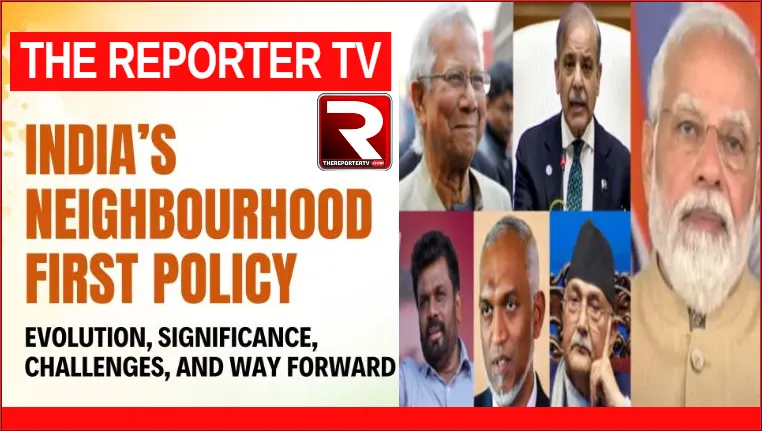New Delhi : India’s Neighbourhood First Policy, launched in 2014 by Prime Minister Narendra Modi to foster stronger ties with its immediate neighbours, is currently facing significant challenges due to political turmoil, shifting alliances, and the increasing influence of China in South Asia.
During the ongoing winter parliamentary session, Congress MP Manish Tewari raised concerns regarding the challenges confronting India’s foreign policy in the region. In his response, External Affairs Minister S. Jaishankar assured Parliament that India’s commitment to development assistance and capacity-building initiatives in the neighbourhood remained strong. Jaishankar highlighted that India had extended financial, infrastructural, and humanitarian aid as per the needs of its neighbours, contributing to their overall economic growth.
The Neighbourhood First Policy: A Vision of Regional Cooperation
The Neighbourhood First Policy, central to India’s foreign strategy under Modi, prioritises building cooperative relationships with South Asian countries, including Bangladesh, Nepal, Bhutan, Sri Lanka, Myanmar, the Maldives, Pakistan, and Afghanistan. The policy aims to ensure regional stability, promote economic integration, and enhance mutual prosperity through infrastructure projects, humanitarian assistance, and capacity-building initiatives.
However, 2024 has tested the limits of this policy as several countries in India’s neighbourhood experience political upheaval and rising external influence, particularly from China.
Bangladesh: A Shifting Political Landscape
The longstanding India-Bangladesh partnership, nurtured over 15 years under Prime Minister Sheikh Hasina, faced turbulence in 2024 after her ouster in August following mass protests against her authoritarian rule. Hasina’s political exile to India, combined with rising extremism in Bangladesh, led to violent clashes against religious minorities, including Hindus, further straining bilateral relations.
Tensions were exacerbated by the arrest of a Hindu monk in Chittagong, and Bangladesh’s accusations of Indian interference. These developments stalled India-financed projects in Bangladesh. Nevertheless, India’s Foreign Secretary Vikram Misri visited Dhaka earlier this month for consultations, aiming to restore stability and reaffirm India’s commitment to a democratic Bangladesh. Despite these efforts, the relationship remains fraught, and the future trajectory remains uncertain.
The Maldives: From Anti-India Rhetoric to Reconciliation
In the Maldives, the rise of pro-China leader Mohamed Muizzu in 2023 initially led to strained ties with India, especially following a controversy in January 2024 over comments by Indian Prime Minister Modi promoting Lakshadweep tourism. The ensuing backlash led to diplomatic tensions and the suspension of Maldivian junior ministers.
However, the relationship took a positive turn by March 2024 when Muizzu, despite his anti-India campaign, acknowledged India as the Maldives’ closest ally and sought debt relief. A visit to China by Muizzu, along with positive developments including continued Indian development aid and high-level diplomatic exchanges, helped thaw relations. His October visit to India culminated in important agreements on defense and economic cooperation, indicating a renewed diplomatic engagement.
Nepal: Growing Chinese Influence and Political Instability
Nepal’s political instability and China’s growing influence have continued to concern India. In 2024, Nepal saw yet another shift in leadership as Prime Minister Puspa Kamal Dahal (Prachanda) was replaced by K.P. Sharma Oli of the Communist Party of Nepal-Unified Marxist (CPN-UML). Oli, traditionally seen as pro-China, broke with Nepal’s longstanding tradition of prioritising India by choosing China for his first state visit.
Oli’s government signed a framework agreement with China to implement Belt and Road Initiative (BRI) projects, raising alarms in New Delhi. While Nepal resisted commercial loans for these projects, China’s flexible funding model, blending grants and loans, threatens to deepen Nepal’s dependence on Beijing and could further erode India’s influence in the region.
Pakistan: Continued Hostility
India’s relationship with Pakistan remains in a state of prolonged hostility, with no sign of rapprochement. The ongoing Kashmir dispute, cross-border terrorism, and political tensions have left bilateral ties in limbo. Despite External Affairs Minister Jaishankar’s participation in the Shanghai Cooperation Organisation (SCO) meeting in Islamabad in October, no formal bilateral dialogue has taken place, underscoring the deep divisions between the two neighbours.
Afghanistan: Engaging with the Taliban?
Although India does not recognise the Taliban government in Afghanistan, there have been some interesting developments in recent months. India has maintained its humanitarian assistance to Afghanistan and engaged with the Afghan business community to facilitate trade through Iran’s Chabahar port, in which India has significant investments.
The recent visit of India’s Joint Secretary for Pakistan, Afghanistan, and Iran, JP Singh, to Kabul further underscored New Delhi’s pragmatic approach to the situation. During the visit, Singh discussed humanitarian aid and infrastructure projects. Meanwhile, the Taliban appointed an Indian national, Ikramuddin Kamil, as an acting consul in Mumbai, a development that could signal some thawing in relations, though the overall political dynamics remain complex.
Myanmar: Diplomatic Engagement Amidst Civil War
Myanmar’s ongoing civil war presents a significant challenge for India, particularly given the ethnic conflict in India’s northeastern states. India has been engaging with Myanmar’s military junta, seeking to manage insurgencies and maintain key infrastructure projects like the India-Myanmar-Thailand trilateral highway and the Kaladan Multimodal Transit Transport Project.
Despite the ongoing conflict, India has continued to interact with Myanmar’s ethnic armed groups and invited their representatives to New Delhi for discussions. These efforts reflect India’s pragmatic approach to a volatile situation in Myanmar, balancing security concerns with regional economic interests.
Sri Lanka: A Stable Partnership
Sri Lanka, one of India’s closest neighbours, remains a relatively stable partner despite the change in leadership. In September 2024, Anura Kumara Dissanayake of the National People’s Power (NPP) alliance became Sri Lanka’s president, replacing Gotabaya Rajapaksa. Speculation arose over whether Dissanayake would tilt towards China, but India had anticipated his rise and proactively engaged with him.
External Affairs Minister Jaishankar’s visit to Colombo in the wake of Dissanayake’s election helped cement bilateral ties, and Dissanayake’s subsequent visit to India in December saw the release of a joint statement on fostering partnerships for a shared future.
Bhutan: Strong Ties Continue
India’s relationship with Bhutan remains as strong as ever, with continued cooperation on hydropower development and significant financial aid to Bhutan’s 13th Five-Year Plan. Bhutan’s King Jigme Khesar Namgyel Wangchuck visited India twice in 2024, and the bilateral relationship remains one of India’s most stable and cordial.


